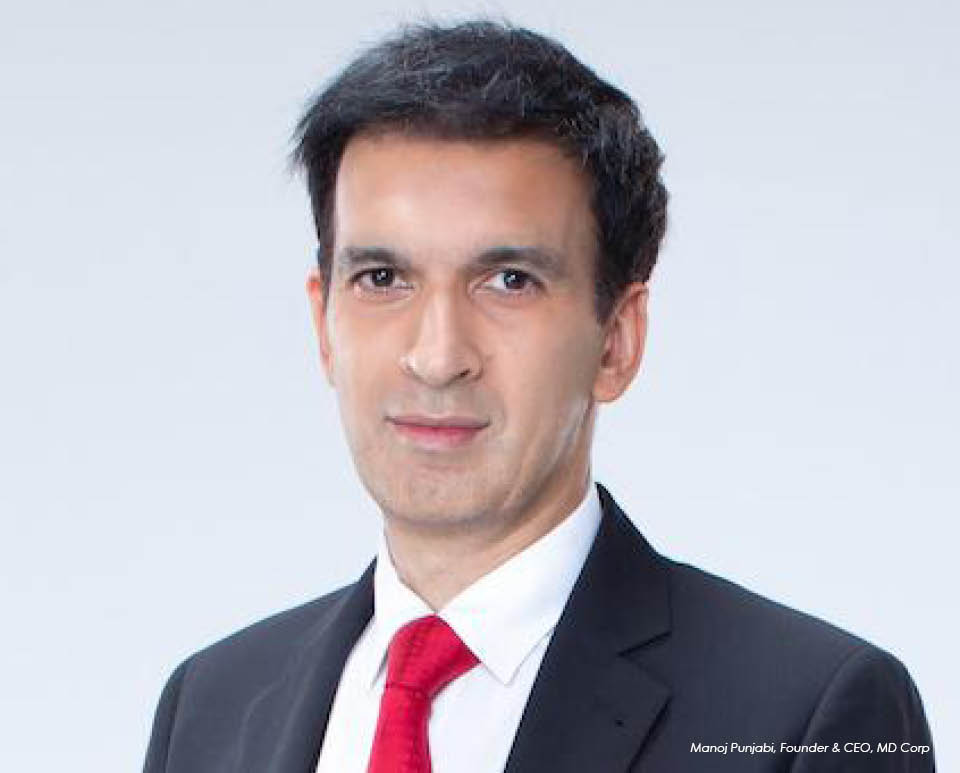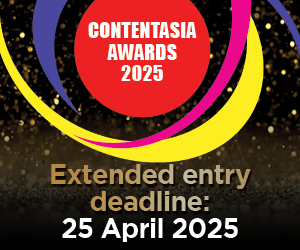
Indonesia’s MD Corp is at the centre of Southeast Asia’s streaming hotbed, with at least 13 feature films streaming across platforms, new original series and titles sold to virtually everyone: Disney+ Hotstar, WeTV, Viu, Netflix, Vidio, Migo and Telkomsel Maxstream. The company’s founder and chief executive, Manoj Punjabi, talks about dealing with the surge in demand, how he views the shifts in release windows, production partnerships, and what comes next after blockbuster earnings reports.
How have you changed your business to deal with the surge in demand? “For the last four years, we focused on feature films, but I’m a huge fan of OTT. The pandemic really changed the situation... we’ve pivoted 100% to OTT, across everything, including series. We have 22 original series in the making and so many OTT movies. This is the future.”
What are you forecasting about the level of demand for Indonesian content? Do you think the demand for content you’ve seen during the pandemic will continue even as things open up? “I think this will continue and grow. OTT is inevitable, it’s everywhere, and the high demand for local content will remain in countries like Indonesia, India and China, which have huge populations. Local content will not be stopped. Foreign content still has a 60% market share in cinemas against 40% local. But in OTT, the ratio will be 80:20 in favour of local. Or maybe even 90:10. We’re at a very early stage. Many players are not here yet. But even now, with a couple of big players, there’s already a huge change. I believe this growth for Indonesian content is not going to stop here, that will be the game changer. For example, our first original series release on WeTV, My Lecturer My Husband, immediately became number one... That shows that one local title can change a platform, it shows the power of local content. And again, Antares, is number one of all time. It’s breaking records.”
With all this demand, have production budgets and talent costs increased significantly? “Budget will increase based on what’s required. It just can’t increase for the sake of ‘I just want to increase’. We are using film actors, film crews, film directors. All these elements are very different from the usual soap opera/sinetrons, where one epis...
Indonesia’s MD Corp is at the centre of Southeast Asia’s streaming hotbed, with at least 13 feature films streaming across platforms, new original series and titles sold to virtually everyone: Disney+ Hotstar, WeTV, Viu, Netflix, Vidio, Migo and Telkomsel Maxstream. The company’s founder and chief executive, Manoj Punjabi, talks about dealing with the surge in demand, how he views the shifts in release windows, production partnerships, and what comes next after blockbuster earnings reports.
How have you changed your business to deal with the surge in demand? “For the last four years, we focused on feature films, but I’m a huge fan of OTT. The pandemic really changed the situation... we’ve pivoted 100% to OTT, across everything, including series. We have 22 original series in the making and so many OTT movies. This is the future.”
What are you forecasting about the level of demand for Indonesian content? Do you think the demand for content you’ve seen during the pandemic will continue even as things open up? “I think this will continue and grow. OTT is inevitable, it’s everywhere, and the high demand for local content will remain in countries like Indonesia, India and China, which have huge populations. Local content will not be stopped. Foreign content still has a 60% market share in cinemas against 40% local. But in OTT, the ratio will be 80:20 in favour of local. Or maybe even 90:10. We’re at a very early stage. Many players are not here yet. But even now, with a couple of big players, there’s already a huge change. I believe this growth for Indonesian content is not going to stop here, that will be the game changer. For example, our first original series release on WeTV, My Lecturer My Husband, immediately became number one... That shows that one local title can change a platform, it shows the power of local content. And again, Antares, is number one of all time. It’s breaking records.”
With all this demand, have production budgets and talent costs increased significantly? “Budget will increase based on what’s required. It just can’t increase for the sake of ‘I just want to increase’. We are using film actors, film crews, film directors. All these elements are very different from the usual soap opera/sinetrons, where one episode takes a day to shoot. Instead of a two-hour feature film, we’re making 10 or 15 hours of almost the same quality for a series. So that’s a difference. It increases the budget but it’s still manageable. Covid protocols have increased our budgets seven or eight percent. We can still make things happen and I don’t want to compromise on the quality. This is not what you get on free TV. There has to be that difference”.
You remain very active in film as well as premium series. Are you still involved in the sinetron side of the business? “No. I’ve moved up the ladder. If I’m doing sinetron and doing this, I would be contradicting myself. We decided not to proceed with sinetron three years ago in order to focus on feature films and to plan for series, which we are now doing.”
Returning seasons, which are happening in the premium space in Indonesia, are obviously important because they’re priced at a premium. How successful have you been with renewals and what are you hoping for? “I look at that differently; it’s not only the premium price. Our first series, My Lecturer My Husband we are making season two... we are already preparing either season two of Antares or a feature film. This is what we are debating; sometimes a good drama series goes into a feature film. That’s how I see the value. We have committed to 22 original series this year so far (to end August). That’s how I see the value. For MD, it’s about scale. The other benefit is that, with returning seasons, the universe expands, and that’s exciting to me... This is what I’ve been waiting for. When people call the stars by their character names, that’s when I see we have hit the jackpot.”
You mentioned feature films. There’s a lot of debate on the long-term impact on the theatrical business of cinema closures during Covid and the direct-to-streaming releases. How do you think the theatrical and OTT release windows might develop and what are you preparing for? “From my side, it is very simple. We have 20 movies that were meant for theatrical that have gone direct to streaming. I have another nine ready. I still want to wait for the cinema. We are ready to release those movies in 2022. We are not in a hurry. If a movie is a huge theatrical hit, we have a potential of part two. If you go to streaming with the big titles, you don’t have that potential of going to part two or part three, of creating a universe for that particular movie. That’s something that is very not favourable to me... We have a four months/120-day window to OTT after theatrical [but with Covid-related cinema closures and uncertainty]... it’s too early to decide what the windows will be. I think distributors and exhibitors are going to have to be flexible. If we are stubborn or trying to play an ego game, both will lose.”
What’s your production target? “My target is to produce 50 original series a year, up to 500 to 800 episodes a year of original series.”
Would you ever go back to producing sinetron? “I’ve produced up to 2,500 hours of drama series a year for sinetron. I have that capacity... If an opportunity comes I’m always open. I’m a very practical person in terms of how we do business. [00:16:01] We should be able to bend ourselves like an eraser but not break. Right now the strategy is focus, focus, focus on series and feature films.”
Do Indonesia’s content regulations pose a challenge in, say, stories that deal with subjects, such as LGBTQ+ or politics? “I like positive controversy. It creates a sensation. I try to stay miles away from negative controversy. Feature films are more controlled, you can still include subjects that would be too sensitive for original series. The viewers are different, the sensitivity levels are different. Let’s say this: we are very particular in how we handle topics such as LGBTQ+ or politics. It needs to be done in the right way.”
Do you keep all the rights to your series? “Yes.”
Where are regional and international production and co-production partnerships on your list of priorities this year? “I don’t think anything will happen in 2021. It’s in my pipeline, it’s at the back of my mind. It’s always something I want to do, but at the right time at the right place, that’s the plan. Right now, not for this year, for sure.”
Do you foresee more Indonesian content being exported outside of Southeast Asia? And do you think the quality, or even the stories, are relatable to global consumers? “When we make local content, it’s more for the Indonesian audience. For MD, I don’t focus on what the international appeal would be because I can’t win both worlds. It’s a very different world. Indonesian content is not like Bollywood content, or even European content that has traveled more lately. I would say that Indonesian content is very Indonesia-centric right now, unless it’s a festival movie, which caters to an international market. So to be realistic, no. I’m catering to the Indonesian audience. Sometimes the subject might be universal, might appeal to other markets. Or maybe we would capture the Indonesians living outside Indonesia. We are accepted in the region, in Malaysia, Singapore, for instance. It travels that far, that’s for sure. Sometimes our content, like Habibi, can go to Germany and other countries. But very little content travels... What we are doing, original series, movies, it has to be Indonesia-centric. That’s how I see it.”
Published in ContentAsia November 2021 Magazine



















